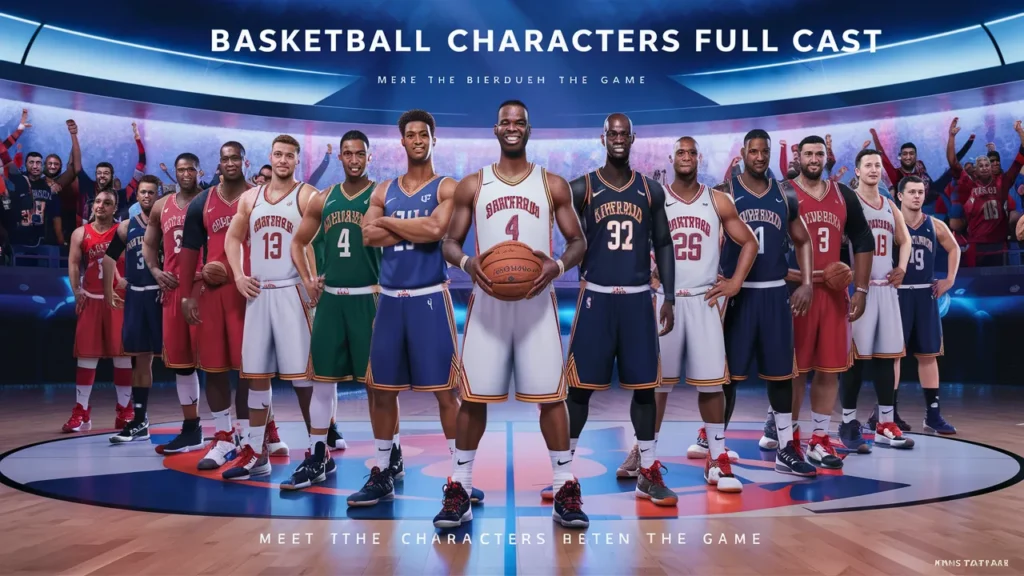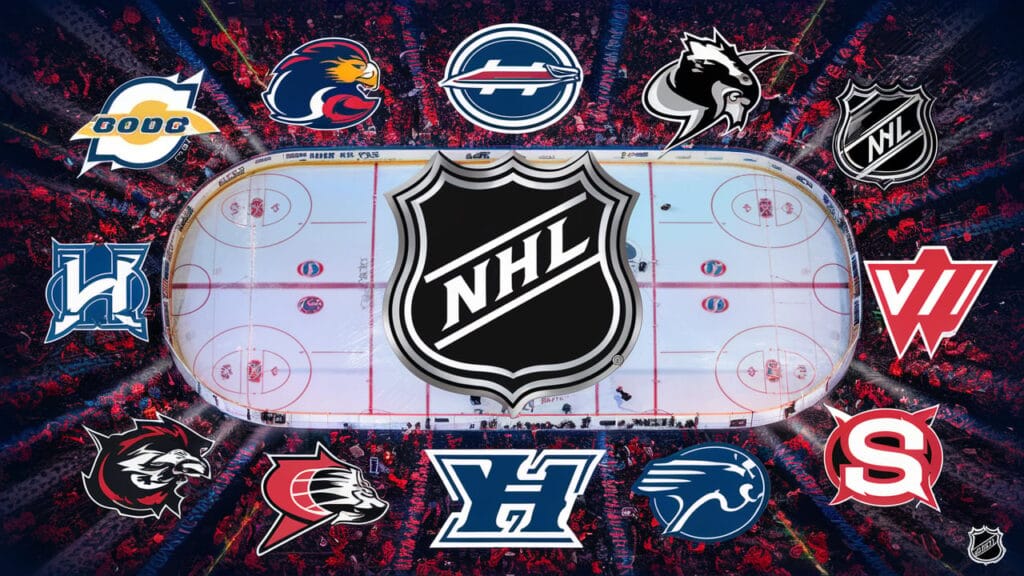Introduction: Understanding the Full Cast of Basketball
Basketball is one of the most popular and fast-paced sports in the world, captivating millions of fans across the globe. But behind the action-packed games and buzzer-beating shots lies a deeper narrative involving numerous characters who shape and define this sport. Basketball Characters Full Cast From the superstars on the court to the strategists on the sidelines, and even the passionate fans in the stands, basketball thrives due to a collective effort of diverse roles.
In this comprehensive guide, we dive into the full cast of basketball—exploring the players, coaches, referees, support staff, and even the often-overlooked contributors like statisticians and medical teams. Whether you’re an aspiring player, an avid fan, or just someone who enjoys the game, understanding these characters adds a richer dimension to the sport, offering insights into the dynamics that make basketball a global phenomenon.
1. Basketball Players: The Stars of the Show
At the heart of every basketball game are the players, the athletes who electrify the court with their athletic prowess, skill, and strategy. Basketball Characters Full Cast Each position in basketball comes with specific responsibilities, and every role is essential to the team’s success. Let’s explore the five key positions and the types of players who dominate them.
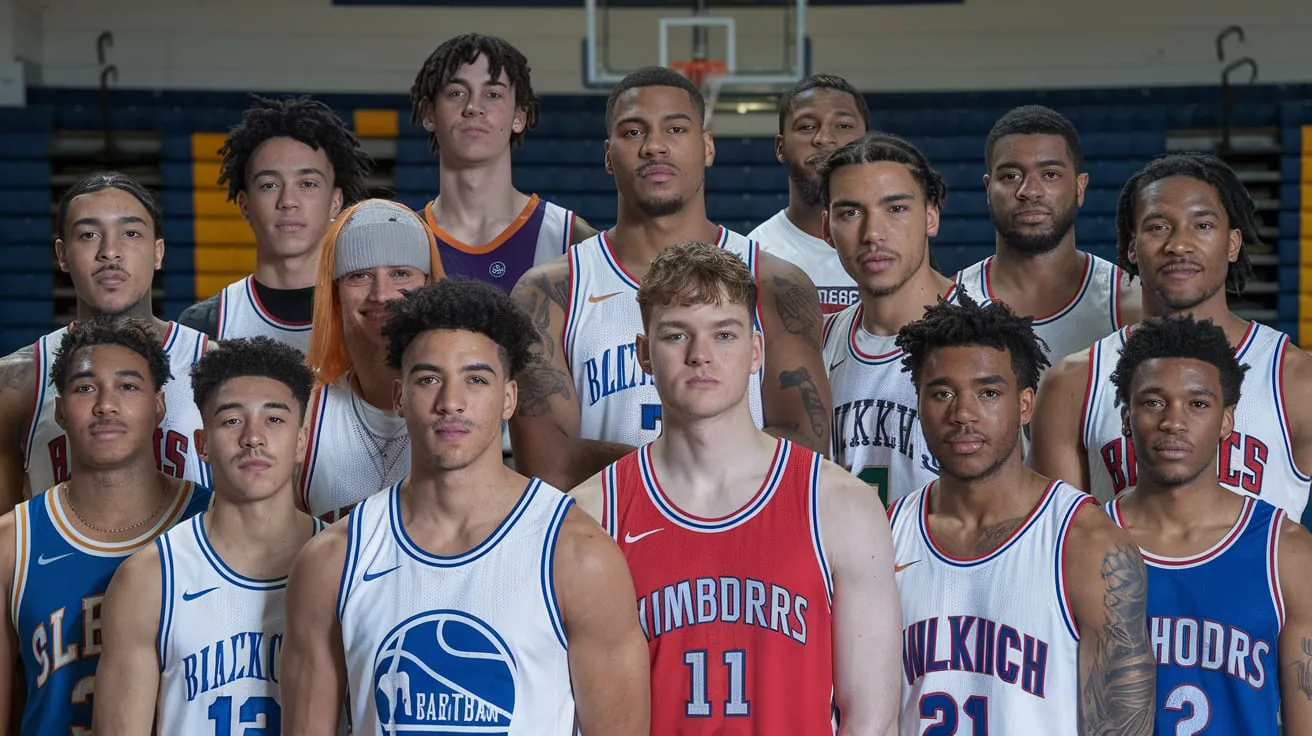
Point Guards
The point guard, sometimes known as the “floor general,” is in charge of planning the offense. This player’s main job is to ensure that the ball is distributed effectively to teammates while also taking advantage of scoring opportunities. Think of players like Chris Paul and Steph Curry, whose basketball IQ and leadership skills make them invaluable assets on the court.
Key Attributes of a Point Guard:
- Court vision and awareness
- Quick decision-making
- Excellent passing and ball-handling skills
- Leadership qualities
Shooting Guards
Shooting guards are often the best shooters on the team, tasked with scoring points from various ranges. These players need to be sharp, versatile, and able to knock down shots under pressure. Basketball Characters Full Cast Legends like Michael Jordan and Kobe Bryant are prime examples of shooting guards who could take over games with their scoring abilities.
Key Attributes of a Shooting Guard:
- Precision in shooting from mid and long-range
- Strong defensive skills
- Ability to drive to the basket
- Versatility in offensive tactics
Small Forwards
Small forwards are often the most versatile players on the court. They are expected to score, defend, and rebound—essentially filling in any gaps on the team. Basketball Characters Full Cast Modern players like LeBron James have redefined the small forward role, making it a position that requires a combination of strength, skill, and basketball IQ.
Key Attributes of a Small Forward:
- Adaptability on both offense and defense
- Physical strength and agility
- Strong scoring ability both inside and outside
- Solid rebounding and assisting skills
Power Forwards
Power forwards play close to the basket and are often key rebounders and scorers in the paint. They combine size with skill, and their role is critical when it comes to controlling the tempo in the post. Power forwards like Tim Duncan have made significant impacts with their ability to score efficiently near the rim while playing solid defense.
Key Attributes of a Power Forward:
- Strong post moves and rebounding
- Physical dominance in the paint
- Versatility in defending larger players
- Capacity to use mid-range shooting to spread the floor
Centers
The center is typically the tallest player on the team, responsible for anchoring the defense, blocking shots, and grabbing rebounds. Modern centers, like Nikola Jokić, also possess playmaking abilities that make them more than just a post presence. As basketball evolves, centers have begun to take on more responsibilities beyond traditional shot-blocking and dunking.
Key Attributes of a Center:
- Shot-blocking and rim protection
- Rebounding and controlling the boards
- Post-up offense and close-range scoring
- Ability to set solid screens and assist in offensive plays
2. Coaches and Their Impact on the Game
Basketball is not just a game of physical skills; it is a chess match that requires strategic planning and tactical execution. This is when coaches’ roles become extremely important. Every successful team has a visionary coach behind it, guiding players, developing game plans, and making crucial in-game adjustments.
Head Coaches
The head coach is the leader of the team, responsible for setting the strategy, creating a winning culture, and ensuring that players perform to their potential. Great head coaches like Phil Jackson and Gregg Popovich have mastered the art of motivating players while also being tactical masterminds. Basketball Characters Full Cast They manage not just the game on the court but also the personalities and emotions of their players.
Key Responsibilities of a Head Coach:
- Develop game strategies and playbooks
- Manage player rotations and in-game tactics
- Foster team chemistry and morale
- Make crucial decisions under pressure
Assistant Coaches
While the head coach might be the face of the coaching staff, assistant coaches play an equally important role in the development of players and the execution of strategies. Basketball Characters Full Cast These coaches often focus on specific aspects of the game, such as defense, offense, or player development.
Specializations of Assistant Coaches:
- Defensive coordinators
- Offensive strategists
- Player development and skill enhancement
- Game film analysts
Trainers and Specialized Coaches
Beyond the tactical coaching, teams also have specialized trainers and performance coaches who work on physical conditioning, injury prevention, and overall health management. A strong fitness and conditioning team is crucial in ensuring that players are in peak form, especially during the grueling basketball season.
Read More: LA Olympics New Sports: Exciting Additions for 2028 Games
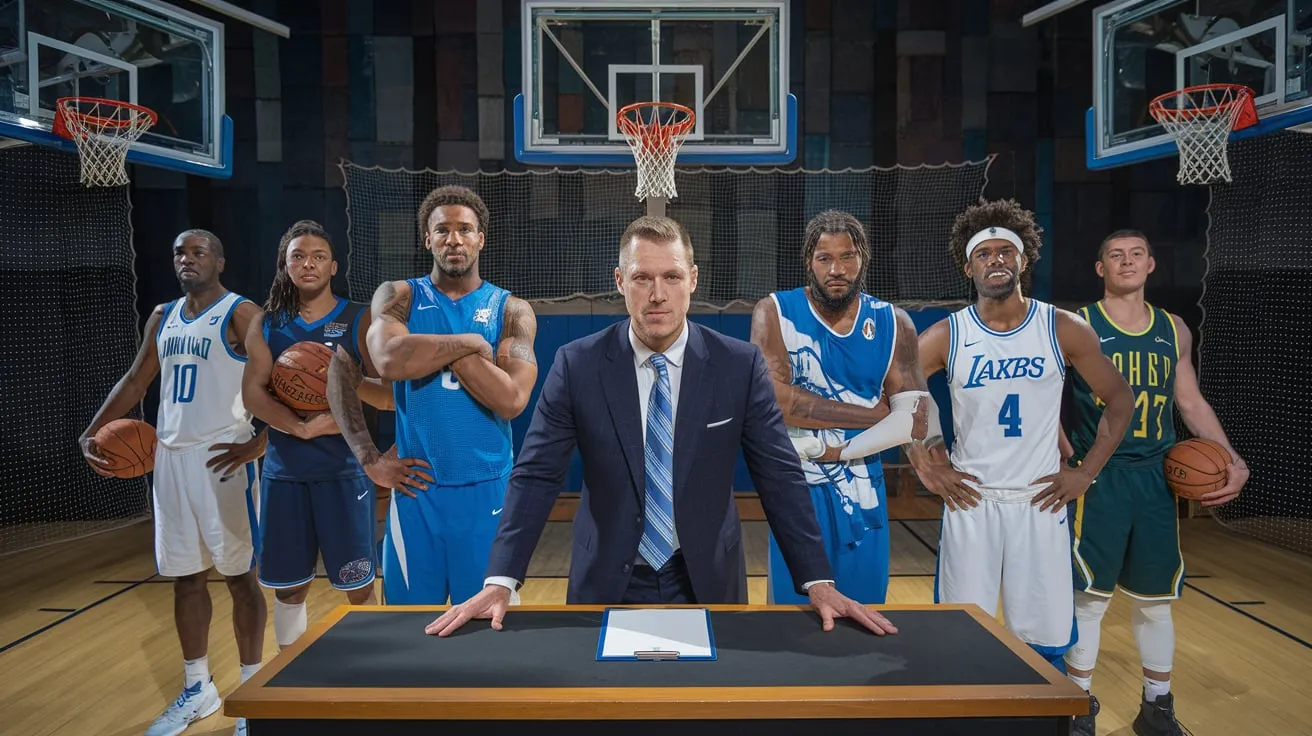
3. Referees: The Game’s Lawkeepers
Referees are the unsung enforcers of basketball, ensuring that the game is played fairly and within the rules. Without referees, the game would descend into chaos, and their impartial judgments maintain the integrity of the sport.
On-Court Referees
On-court referees are responsible for making split-second decisions on fouls, violations, and infractions during the game. Their job requires immense concentration, impartiality, and a deep understanding of the rules. NBA referees undergo rigorous training to maintain the high standards expected in professional basketball.
Key Responsibilities of On-Court Referees:
- Enforcing game rules and regulations
- Issuing fouls and violations
- Managing disputes and player conduct
- Ensuring fair play throughout the game
Video Assistant Referees (VAR)
The introduction of Video Assistant Referees (VAR) has revolutionized basketball officiating. In high-stakes games, critical calls are now reviewed using video footage, reducing the margin of error and improving the fairness of the game.
Scorers and Table Officials
Scorers and table officials handle various off-court duties such as tracking game scores, managing the shot clock, and documenting player statistics. Though not always in the limelight, their roles are vital in ensuring the smooth operation of games.
4. Team Owners and General Managers
Behind every successful team is a well-run organization, led by team owners and general managers who make key financial and roster decisions. While the players and coaches often get the credit for wins, the contributions of these executives cannot be overstated.
The Role of Ownership
Team owners provide the financial backing necessary to build a competitive roster. They are responsible for hiring key personnel, from coaches to general managers, and investing in the team’s long-term success. The impact of a visionary owner, like Mark Cuban of the Dallas Mavericks, can lead to lasting success for a franchise.
General Managers and Player Trades
General managers (GMs) handle the day-to-day roster decisions, including trades, drafts, and player acquisitions. They need to have a deep understanding of talent evaluation, salary caps, and team chemistry to make smart decisions that benefit the team in both the short and long term.
5. Support Staff: The Unsung Heroes
Behind every team are support staff members who work tirelessly to ensure that everything runs smoothly. These unsung heroes play a crucial role in the success of a basketball team.
Medical Staff
The medical staff is in charge of overseeing players’ health and welfare, treating injuries, and creating recovery strategies. In a physically demanding sport like basketball, having a strong medical staff is essential for keeping players healthy and on the court.
Strength and Conditioning Coaches
Strength and conditioning coaches work to improve the physical performance of players, helping them build the endurance and strength needed to compete at the highest level. Their focus on injury prevention and recovery is key to player longevity.
Equipment Managers
Equipment managers ensure that players have everything they need, from uniforms to practice gear. While it might seem like a minor role, having the right equipment can make a significant difference in player performance.
6. Basketball Analysts and Statisticians
In the modern game, data and analytics have become indispensable tools for teams, coaches, and players. Basketball analysts and statisticians provide insights into player performance, team efficiency, and game strategy.
Importance of Analytics in Modern Basketball
Data analytics has transformed the way basketball is played and coached. Teams now rely heavily on advanced metrics such as Player Efficiency Rating (PER), True Shooting Percentage (TS%), and Offensive/Defensive Rating to gain a competitive edge. Analytics-driven strategies have helped teams like the Golden State Warriors revolutionize the game.
Performance Metrics and Game Strategy
Statisticians collect and analyze data during games, providing coaches with real-time insights that influence game decisions. Their work also plays a key role in evaluating players during drafts and trade negotiations.
7. The Fans: The Heartbeat of Basketball
No discussion about the full cast of basketball would be complete without mentioning the fans. The passion, dedication, and energy they bring to the game are unmatched, making them an essential part of the sport.
In-Stadium Fans
Fans who attend games in person create an electric atmosphere that can inspire players and influence the momentum of a game. The iconic “sixth man” concept shows just how impactful a home crowd can be on a team’s performance.
Global Basketball Communities and Social Media Influence
Basketball has a global fan base that interacts not just in stadiums but across social media platforms. Fans discuss games, share highlights, and build communities, enhancing the global reach of the sport. Platforms like Twitter and Instagram have allowed fans to engage with their favorite players and teams like never before.
8. Media and Commentators: Shaping Basketball Narratives
The way basketball is consumed has evolved, with media personalities and commentators playing a huge role in shaping how the game is perceived by the public.
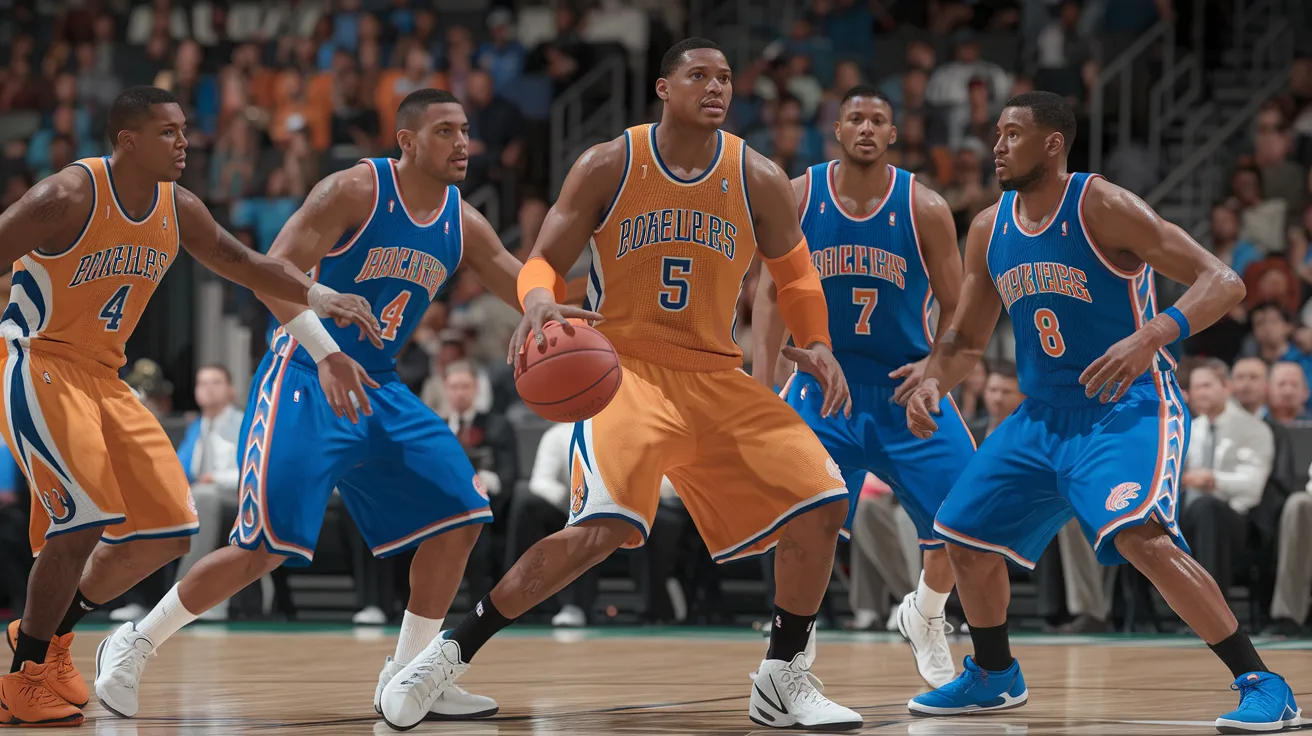
Sports Broadcasters
Broadcasters like Marv Albert and Mike Breen bring the excitement of the game into living rooms across the globe. Their play-by-play commentary helps fans experience the highs and lows of each moment, making the game more accessible.
Analysts and Talk Show Hosts
Beyond the game itself, basketball is a topic of constant discussion in the media. Talk show hosts like Stephen A. Smith provide opinions, debate, and analysis that keeps fans engaged throughout the year, even during the off-season.
People Also Ask
Who are the support staff in a basketball team?
What do basketball statisticians and analysts do?
How has technology impacted basketball officiating?
What do team owners do in basketball?
Conclusion
Basketball is much more than a sport; it’s a complex ecosystem where every character plays a pivotal role in the success of the game. From the players who grace the court to the coaches who strategize, the referees who ensure fairness, and the fans who bring the energy, every piece of the puzzle is essential.
Understanding this full cast of basketball allows you to appreciate the game on a deeper level, whether you’re watching a local match or the NBA Finals. It takes an army of professionals, fans, and unsung heroes to make basketball the thrilling sport we love today.

